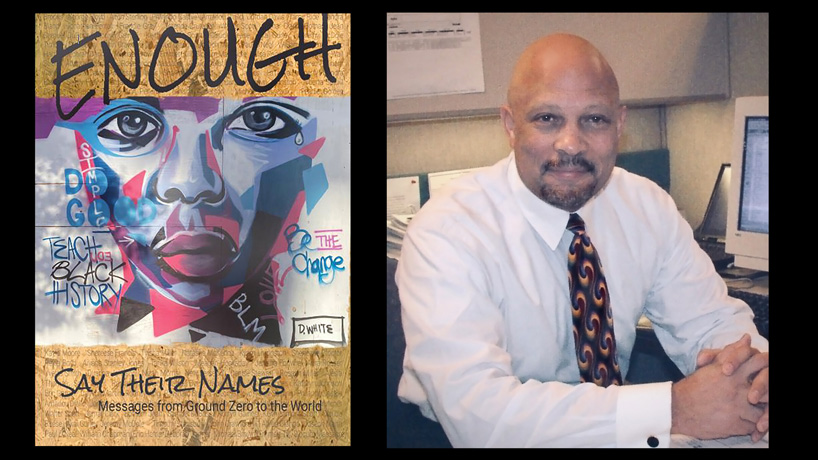
Ronald Montgomery, who studied at UMSL in the 1970s, recently self-published a book, “Enough: Say Their Names …” which uses poetry, photography and art gathered from protests to address issues of police violence. Graphic designer Joan Barnidge, a staff member in University Marketing and Communications, designed the book. (Submitted photos)
When last summer’s storm of social unrest blew in on the wave of an emerging pandemic, poet and University of Missouri–St. Louis alumnus Ronald Montgomery answered the call to do what he’s been doing for almost five decades – use the beauty of art to fight the beast of injustice.
“I write. That’s what I do. I talk, I motivate people,” said Montgomery, a motivational speaker and author of more than 15 books. “I felt like I should be doing something and virtually everything I do is about connecting with people. About influencing ideas, communicating ideas and understanding, and being able to relate to something.”
Montgomery’s latest book “ENOUGH: Say Their Names …” uses poetry, photography and art gathered from protests to help people understand the impact of the recent killings of unarmed African Americans by the police and the attention those actions bring to deeply-rooted racial inequities.
“Our goal with the book is to get people who are not of color to understand more about our challenges, the things we face.” said Montgomery. “George Floyd, me – virtually every other man of color in America – who drives down the street and sees the police coming up behind them. Not wanting to get pulled over and getting that knot in your stomach, knowing that this might end badly.”
Following Floyd’s death in Minneapolis, Montgomery travelled to “ground zero” to document the protests – capturing the feel and spirit in both words and images.
“I took the messages off the street,” he said. “I went out to the places, took the photographs of the protesters, signs, graffiti, anything that was a message that was relevant to what we were doing in terms of protesting and trying to communicate the need for change.”With the idea of using images to inspire words, Montgomery combined his photos with those from other photographers and artists and brought them to a cadre of writers and poets. The result is a self-published 226-page book of art and poetry completed from start to finish in 147 days in 2020.
Joan Barnidge, a graphic designer in University Marketing and Communications at UMSL, designed the book.
“I gathered writers to take a piece of art and to be inspired to create art,” he said. “People came together and approached me about being part of the project because they were so committed to justice. I told them doing this will change you, will change how you see things, will change who you are. It did indeed change them, but it profoundly changed me. Because the reality is, like everyone else, I have to fix myself – my attitudes, perceptions, behavior.”
Montgomery, 71, has spent most of his life working on growth – his own and others. The St. Louis native enlisted in the Army during the Vietnam era, ending up in Europe and falling in love with language and linguistics. Following the military, Montgomery attended UMSL in the early 1970s to study language, and to grow into adulthood.
“I matured at UMSL,” Montgomery said. “When I went there, there was diversity. You didn’t have to be rich to go there, you had to love knowledge. It was available, it was engaging, it seemed like a place where there were no walls around it. It was surrounded by just doors and windows.”
Montgomery’s love of language led him to the United States Defense Language Institute where he found himself one of few African Americans leading the conversation on what was then called “race relations.”
“I started out as the spokesperson for the six Black people out of hundreds that were there,” Montgomery said, laughing. “But what I discovered when teaching human relations, race relations, diversity training, whatever you call it, was that it’s not just about me. It’s about people of color as a community and all people as part of the family.”
Through those experiences, Montgomery has used the art of poetry to express himself. Over the years he turned his “shoeboxes full of poems” into published books including “Let’s Heal STL,” inspired by the killing of Ferguson teenager Mike Brown by police in 2014.
Montgomery said his latest book, which he has been promoting through media interviews, Zoom poetry readings and social media posts, is a means that he hopes can inspire change.
“Did I write all this for nothing, or did I write if for the one person who is changed?” asked Montgomery, a father of two adult children. “I choose to believe I wrote it for the Amanda Gormans out there. Somebody got her started, and maybe I’ll get someone started that will be another Amanda Gorman.”














